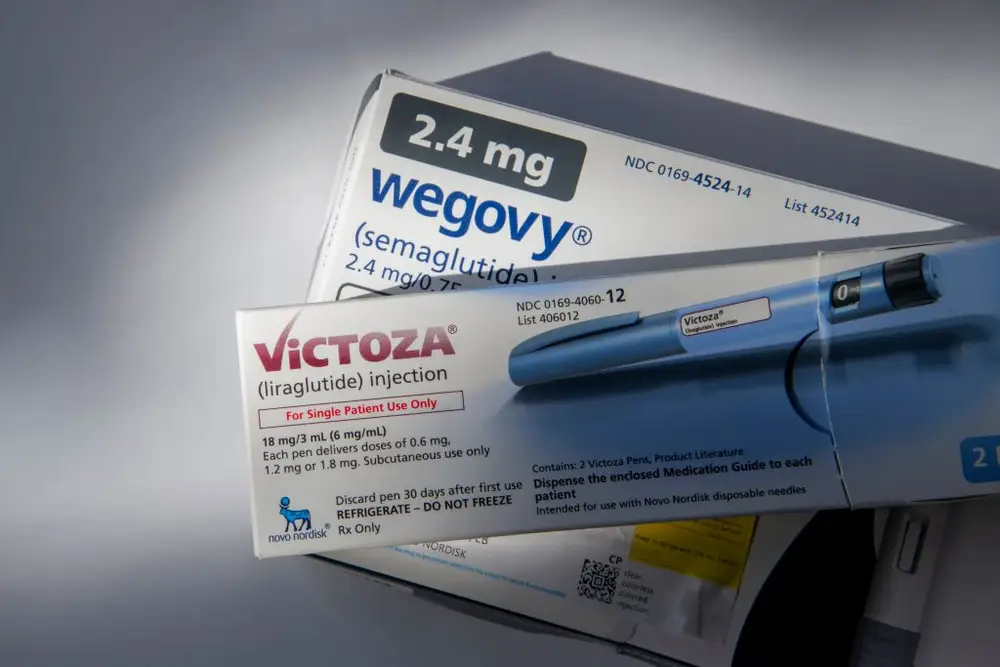Weight-loss drugs could stave off dementia, small study finds

Liraglutide, like semaglutide, is manufactured by Novo Nordisk.
Diabetes, weight loss, heart disease, sleep apnea, kidney disease, and now … dementia?
Scientists are racing to discover whether the new class of weight-loss drugs, originally approved to treat type 2 diabetes, might be repurposed to treat all kinds of other conditions.
Today, a group of dementia researchers from the UK released some early results that suggest it’s possible these trendy injections might also stall the progression of dementia.
The results were announced at the Alzheimer’s Association International Conference in Philadelphia on Tuesday, and have not been published in a peer-reviewed science journal yet.
Some independent experts say we shouldn’t get too excited just yet. Still, the study authors insist this is proving to be a promising area of research
A daily injection for brain preservation

For the study, researchers spent a year tracking brain changes across 204 Alzheimer’s patients with mild to moderate disease. Half of the group received a placebo drug. The other half received a daily dose of liraglutide, a medication that exists in the same class of drugs as Ozempic, Mounjaro, and Wegovy. (They all mimic a hormone called GLP-1, which makes you feel full.)
While the study wasn’t able to successfully achieve every outcome it aimed for, it did appear to show the shots having some positive effect on both cognitive function and brain volume preservation.
It’s still an open question whether injectables for weight loss can help slow down this brain disease. Because so many different factors appear to influence how Alzheimer’s progresses over time, experts are starting to coalesce around the idea that there will likely never be one single drug that can treat Alzheimer’s outright. Patients may need an ever-evolving cocktail of different things to preserve whatever brain function they have left.
“It is hard to make sensible critiques on only an abstract and press release, without the full details of the results,” Stephen Evans, an emeritus professor at the London School of Hygiene and Tropical Medicine, who was not involved in this study, told the Science Media Centre. “It sounds like it is worth pursuing a larger trial, but these results cannot demonstrate that liraglutide can protect against dementia.”
A ‘statin’ for the brain?

Connections between hippocampal neurons (brain cells)
Not everyone who started this trial ended up enjoying taking liraglutide every day. By the end of the trial, 23 of the 102 participants assigned to treatment dropped out of the study (compared to only 15 dropouts on placebo.) Many taking the drug complained of nausea, one of the most common side effects of GLP-1 drugs, which work to regulate blood sugar, and end up slowing down digestion.
But, those who stuck with the shots seemed to display better final performance on their memory tests than their peers who hadn’t injected GLP-1s. Doctors also saw about 50% less volume loss in key areas of their brains on MRI scans, including parts of the brain responsible for memory and decision-making.
“The slower loss of brain volume suggests liraglutide protects the brain, much like statins protect the heart,” Dr. Paul Edison, a professor of neuroscience at Imperial College London who led the study, said in a release. “While further research is needed, liraglutide may work through various mechanisms, such as reducing inflammation in the brain, lowering insulin resistance and the toxic effects of Alzheimer’s biomarkers amyloid-beta and tau, and improving how the brain’s nerve cells communicate.”
One thing liraglutide didn’t appear to do for the patients in this trial was meaningfully improve their brain’s glucose metabolism, which is another key part of dementia progression. This was the main goal of the trial. Experts have seen how dementia patients’ brains get worse and worse at efficiently using glucose for energy as their disease progresses, but the calculus is always complicated. With Alzheimer’s, it’s been especially difficult for scientists to untangle cause from effect.
Edison, a leading expert in brain imaging for Alzheimer’s and other neurodegenerative diseases, told B-17 that he still believes there may be an effect. He thinks this study was too small to show a meaningful difference in glucose metabolism, and that GLP-1 drugs may also influence the brain in more complex ways than we understand. Edison said future studies should focus less on markers in the brain, and more on “cognitive” results, like patient performance on memory tests.
Other drugs recently approved to treat Alzheimer’s also aim to slow down the rate at which patients lose their memories and reasoning skills, but they work differently from GLP-1s. Lecanemab, approved by the Food and Drug Administration last year, and donanemab, out earlier this month, are both antibody treatments built around the idea that reducing the presence of key amyloid plaques in the brain will help slow dementia progression. This seems to be at least partially true, but it may not be the whole story. Maybe GLP-1 drugs can serve a slightly different purpose in dementia treatment.
Bigger studies using more powerful GLP-1 drugs for dementia are already ongoing. Novo Nordisk is testing out semaglutide (that’s the drug branded as Ozempic for diabetes, and Wegovy for weight loss) as a possible Alzheimer’s drug in a major worldwide trial expected to recruit more than 1,800 people across 38 countries. Results are expected in 2025, and will hinge on memory test scores, not glucose metabolism.






